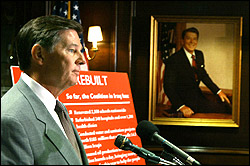Tom DeLay is on his way out. Last week, “The Hammer” even apologized—sort of—for appearing to endorse violence against federal judges. He has run out of high-profile deaths—Terri Schiavo, the pope—whose media coverage distracts from his ethics problems and his steady loss of support from once-loyal Republicans. After more than a decade of corruption, hardball tactics, and sleaze, DeLay is on his way out as a Republican base of power in the House of Representatives.
Don’t celebrate yet.
The Texan is in trouble because he overreached. His grandstanding on the Schiavo case and subsequent high-profile lambasting of the federal judiciary drew attention to him in a way that years of unsavory tactics could not. Schiavo made Tom DeLay a household name, and Americans discovered that they didn’t like what they saw. But the politics DeLay represents is still very much alive and well, even if, politically speaking, DeLay is not.
House Democrats like Seattle’s Jim McDermott have been wailing for years that Republicans have made ordinary work in the House of Representatives impossible. Bills aren’t seen until the last minute; debate is cut off early or not held at all. Corporate lobbyists are often literally writing the bills. This is a result, Democrats say, of an intentional Republican campaign to shut out the Democrats entirely from House business. This is one-party rule, and it continues even if DeLay, one of its prime architects, is falling aside.
Republican National Committee strategists are looking to 2006 as the year in which they will cinch permanent one-party rule: Republican ownership of Congress and the White House for the next 50 years. They’re already halfway there with increasing majorities in the Senate and the House, control of the White House, and a generation of mostly conservative judicial appointments. This is the context in which we must understand DeLay’s attacks on the judiciary and the Senate battle over stymied judicial appointments. The Bush administration has been adamant about appointing conservative, socially activist judges. It’s the one arm of government they don’t already control.
Congress will be in Republican hands for the foreseeable future, barring an electoral earthquake. District gerrymandering and corporate money in elections means that a staggering 94 percent of congressional races in 2004 weren’t closely contested. Incumbents are rarely challenged. The Republican majority was cemented by the crass mid-decade redistricting plans Republicans rammed through in Texas. A 25-seat majority in the House doesn’t sound like much until you consider that probably only 30 or so races will be close in 2006. Same goes for the 55-45 Senate GOP majority.
Presidential polling shows signs of calcification. The red/blue map in 2004 was not only nearly identical at a state-by-state level as that of 2000, county-by-county results hardly changed, as well. Even with slim mandates, the Bush White House has been notable from the beginning for its secrecy and aggressive exercise of power. Put simply, Republicans not only want to wield power, they don’t want anyone looking over their shoulder while they do it.
This is the danger we face: the desire by Republicans to establish permanent one-party rule. DeLay is what that rule looks like—arrogant, corrupt, and ruthless. For years, Democrats have been trying to sound the alarm on DeLay’s tactics, only to have their complaints dismissed as so much partisan bickering.
It’s not. Republicans are governing in a way that is very different from how Democrats ruled when they had the White House and Congress, different even from the way they are governing now that Democrats have the governorship and legislative majorities in Olympia. Certainly, the danger of arrogance and corruption is present when any one party has most of the power. But what Republicans are doing is far more intentional. Unlike Democrats, they have a clear governing philosophy, and it doesn’t leave room for consultation.
Tom DeLay symbolizes this aggressive approach, but this ruthlessness will remain long after DeLay falls from grace. This is a danger to democracy that transcends ideology. When elections aren’t competitive, when one party has and exercises a stranglehold on power, democracy is in trouble—no matter which party it is.
Unless Democrats can find a way to forestall Bush’s more radical judicial appointments, so as to preserve what’s left of the judiciary’s independence, and unless Democrats can somehow find a way, and soon, to reverse congressional and presidential elections, America is on its way to being a one-party state. Tom DeLay is what that state looks like.







